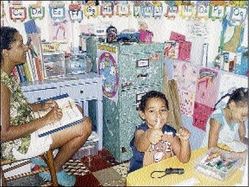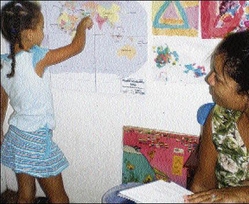
Tricia Spence teaching her children five-year-old Zachary and seven-year-old Gabrielle, in their homeschool. - Contributed
It's a sad day when one hears how expensive schools are, especially in the financial climate we are facing. Parents with two children attending local private schools are currently forking out three-quarters of a million dollars, and more, in some cases, a year, on school fees alone. They still have to feed and clothe their kids, and if they wish them to participate in extra-curricula activities, the numbers keep adding up. In a few years, I, too, will be faced with this horror, and goodness knows what it will cost then! But, is there an alternative?
Tricia and Julian Spence made the decision a year ago to pull their children out of conventional schooling and educate them at home. Ten months later, they have no regrets and are pleased with the progress their offspring are making.
Homeschooling is parent-directed education for their children. The parent decides how the children are to be educated, based on the individuals. The attention they get is far superior to what children in a classroom would receive. "Young children," Tricia explains, "do not have a vast attention span. When it's one on one, you can change the course of learning to suit the capability of that child."
For example, the Spence's five-year-old son, Zachary, has difficulty sitting still when being read to. He likes to colour at the same time. A teacher cannot allow this in a room full of pupils as it might become chaotic.
The family uses a curriculum called Sonlight, which lays out a 36-week year, with 16 weeks of holiday. They have lessons five days per week, from nine to midday, although there are windows of opportunity to learn on the weekends as well. Tricia teaches their children, focusing on religion, history, mathematics, reading, language arts and science. Sonlight sends all the material required to complete the yearly curriculum, with guidelines on how to structure its execution. She was drawn to Sonlight as it is literature-based, focusing on teaching the students to think for themselves.
Once Tricia has read a story to her children, they will discuss each facet and research on the Internet about the country in which the tale takes place. They might even mimic something from the story in their playtime, which they did when reading about a child who became blind after a firecracker accident. They blindfolded each other and walked around their house so that they could experience what it would be like if they couldn't see.
You might be thinking that these kids miss out on vital socialisation.
The truth is, it is not necessary for children to mix with others all day. Tricia has found other homeschool families and they ensure that all 12 children participate in field trips together. The Spence brood also has numerous play dates with friends who are in 'regular' school.
Homeschooling has the bonus of freeing up disposable income that can be used for an array of extra-curricula activities, which are all part of broadening the minds and abilities of young ones. The Spence's daughter, Gabrielle, does ballet, tennis, French, piano, swimming and gymnastics. Through these, she has cultivated friendships with children her age.
A plus for socialisation
We have the misperception that homeschooling produces strange and antisocial children. This is not the case. If anything, they are more likely to be polite and well-mannered. If children spend six hours a day, five days a week, surrounded by so many other pupils, they will pick up bad habits. In a homeschool environment, they are influenced by the parents' values. Also, they do not feel the pressure to have items such as phones and iPods, which their fellow students bring to school.
Tricia says that her children "are happy with what they have and they appreciate what they have. They do not get teased at all. They still go to birthday parties and activities with kids from other schools. My kids do not miss school at all".
You may think that it takes a special kind of person to have the patience to do what Tricia does, but she insists that, "I was more stressed when the kids were in school. We'd have to get up before six every morning and it was always a rush to get out by 7:15 a.m. Now they wake at 7:00 a.m.-7:30 a.m. They can get ready and eat breakfast without rushing."
Tricia and Julian's children have been brought up well. They are smart and inquisitive without being obnoxious, and their social skills are second to none.
Homeschooling them has, in every way I can see, helped them grow into whole and wonderful people.
It seems like there is a real and, perhaps, better alternative to unaffordable private schools after all.
Emmadaltonbrown@hotmail.comSonlight Curriculum: www.sonlight.comThe Sonlight course is accredited by the United States of America's school system.

Seven-year-old Gabrielle Spence points to a place on the world map in their classroom at home. Her mother/teacher, Tricia Spence, looks on. - Contributed